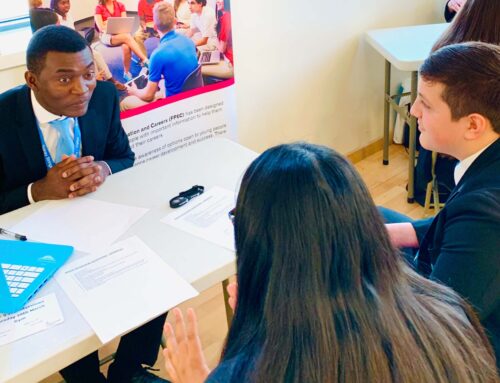
Many of us will have experienced the feeling of ‘failure’ that comes from an unsuccessful job application or interview, not least overthinking every mistake we might have made or calculating the time we have put into researching a company or rehearsing potential interview responses, coupled with the overriding sense that all of this time and effort was to no avail. We are often assailed with a plethora of positive maxims relating to the ability to ‘bounce back’ in order to succeed (Michael Jordan’s “I have failed… and that is why I succeed” quote comes to mind) but in a practical sense, how can we convert our own experience of ‘failure’ in to long-term success?
Following a series of unsuccessful applications and interviews for careers roles in the HE sector that eventually led to a successful appointment, I would like to share some of the practical lessons we can take out of falling at the final hurdle, focusing particularly on the concept of Marginal Gains favoured by many businesses and sports teams, namely the idea of breaking down everything that goes into making something work and trying to improve in each area, however tiny.
Feedback to Level Up
In my experience, one of the most difficult aspects of applying or interviewing for a role in a new sector can be understanding how the recruitment process works in practice. When I first started applying for roles in HE, I was surprised by what was expected of candidates. Following an unsuccessful application, I requested feedback and was informed that I was not articulating clearly enough how I was suitable for the role, having been used to adopting more of a narrative approach when applying for schools-based roles. This helped me to hone my future applications to ensure that they were clear, concise and featured only the information necessary to demonstrate that I possessed the skills and characteristics desired within the job specification.
This led to a number of applications where I successfully passed the first hurdle and was invited to interview, only to find once again that I did not quite have what the employer was looking for. Once again, requests for feedback led to additional tinkering with my approach, whether that was being more explicit in my examples, developing a better understanding of how one university careers service differed to another or analysing my current role in more detail to pick out specific outcomes that demonstrated my leadership and planning skills.
As careers professionals, we often stress to our clients the importance of requesting feedback from recruiters or employers, particularly regarding unsuccessful interviews but it is vital to practice what we preach. Detailed feedback from applications or interviews not only provides us with an invaluable source of intel for our next application, but it also allows us to ‘Level Up’ from each ‘failure’, meaning that the experience itself is never a waste of our time.
The Employability MOT
Returning to the idea of Marginal Gains, another way we can seek to benefit from unsuccessful applications is by using it as an opportunity to undertake an ‘Employability MOT’. This could mean reaffirming our strengths or focussing on particular areas for improvement. For example, interviews at two different HE institutions earlier in the year provided me with different, but equally valuable, feedback that allowed me to audit my skills more clearly. From both interviews, it was clear that my ability to communicate with a range of stakeholders and my grasp of LMI were areas that I was already confident articulating, allowing me to focus on my weaker areas, such as evidencing my ability to lead and manage projects with clear outcomes. By using feedback we might potentially view as ‘negative’ as a way of identifying our areas of improvement via a skills audit, we will be more prepared for our next application and less surprised if the same feedback does rear its head again!
Opportunity Knocks
As a huge fan of the theory (and a nod to the recent passing of CEIAG luminary, John D. Krumboltz), I would be remiss not to mention a benefit of unsuccessful applications that is often overlooked – that of planned happenstance. While many applicants often report nervousness at the prospect of asking for feedback from an employer (or in some cases, simply never hear back), there is much to be gained in making and maintaining contact with a recruiter or employer, regardless of whether you were successful in your initial application.
For example, at two recent interviews I was unsuccessful in securing the position but while speaking to the employers over the phone regarding my feedback, was recommended to apply for other upcoming roles that I might be ‘a good fit’ for. The impression we make, from our initial applications to any contact we have (whether by email or social media), tends to stay with people and by positively engaging with the recruitment process, we create relationships that may stand to benefit us in the future. After all, you never know when you may work with a recruiter or employer again!
Although I have only used the concept of Marginal Gains as an analogy in this article, I believe the message of continuous improvement and making small, regular changes to your practice is a strong one. While it is natural for us to feel a sense of disappointment at not securing an employment opportunity, it can only benefit us to harness these experiences to build future success, even if this does mean balancing the inspirational self-help quotes with some detailed analysis and self-reflection.
Chris Webb RCDP is a Higher Education Careers Professional, Freelance Careers Writer and Co-Host of the Career Development Institute’s #WeAreCareers live-stream show on Facebook, LinkedIn and YouTube. He is also a member of the Association of Graduate Careers Advisory Services (AGCAS) and the Career Writers’ Association. You can connect with Chris via his professional LinkedIn (linkedin.com/in/christopherwebbuk/) and Twitter (@WorldWebb) accounts.





